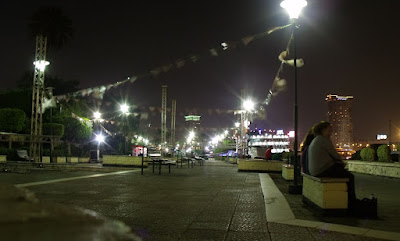Cairo, Egypt
It seems America is always doing something to make me squirm whenever I'm abroad. In Switzerland, it was Columbine and Monica Lewinsky. In Germany, it was that spy plane over China. In England, it was the talk about invading Iraq. In Jordan, it was Abu Ghraib Prison and the re-election of George W. Bush (among other things). When I came back to Jordan, it was failing to speak up against the Gaza War. I know my country isn't trying to embarrass me on purpose, and I guess it's hard to avoid when you're the only superpower of your age.
All this week in class, we've been talking about the Cordoba Center, the so-called "Ground Zero mosque" that's not a mosque and not really all that close to Ground Zero, either, according to my friends who live in New York City. Not just the Cordoba Center, but also the locally
controversial mosques in Murfreesboro, TN; Temecula, CA; Sheboygan, WI; and others. Not to mention that crazy minister in Gainesburg, FL, who organized a Qur'an-burning party. We're not only speaking about it in class, but it's been a hot topic among my friends on Facebook, too, whether in Egypt, Jordan or the United States, whether Muslim, Christian, Jewish or otherwise.
I just want to put my opinion out there, one that may be influenced by my background as a child of Mayflower families, and a student in William Penn's colony.
The United States is a nation settled, founded and populated on principles of freedom, including the freedoms of religion and assembly enshrined in our very founding documents. I would venture to guess that more than half of Americans are descended from immigrants who came to the Americas seeking religious freedoms: Puritans, Quakers, Catholics, Lutherans, Amish, Mennonites, Jews, Tibetan Buddhists, Uygher Muslims, Shi'ites, Sufis, Zoroastrians, Sikhs, agnostics, atheists, humanists.... They have all faced discrimination in America, too, but one by one they become accepted and eventually pass into complete anonymity. "They hate us for our freedoms," said Jon Stewart on the Daily Show (referring to the terrorists, of course), "so is this any time to be exercising those freedoms?" If not now, then when?
But I would also like to point out, especially to my Muslim friends in the Arab world, the bright side of this controversy. For every protest against the building or expansion of a mosque in America, there has usually been a significantly larger counter-protest. Gainesburg's proposed Qur'an burning party is not the norm for that multicultural, welcoming city. Moreover, pro-mosque rallies tend to be led by priests, ministers, rabbis, and other religious and secular leaders who are not Muslim, but who understand the lesson of the German pastor Martin Niemoller:
"When they came for the Jews, I did nothing, for I am not a Jew. When they came for the Socialists, I did nothing, for I am not a Socialist. When they came for the labor leaders, the homosexuals, the gypsies, I did nothing, for I am none of these, and when they came for me, I was alone, there was no one to stand up for me."
I can't tell you how many times I've heard Muslims say, "America is the best place in the world to be a Muslim," whether because of the freedom to practice whatever their personal interpretation of the religion, or because living in an open, pluralistic society like the United States forces you to examine and more deeply understand your religious beliefs. Feisal Abdul Rauf, one of the Cordoba Center's organizers, wrote a wonderful book titled
What's Right With Islam Is What's Right With America, arguing that America's values and religious freedoms are exactly why it's such a great place to be a Muslim, and the American government sends him around the Muslim world to tell people and governments how important freedom of religion is for Islam's future.
I want to see America reach the full potential to which her founders aspired. After all, the first nation to recognize the United States as an independent, sovereign nation was a Muslim nation, Morocco.




















































